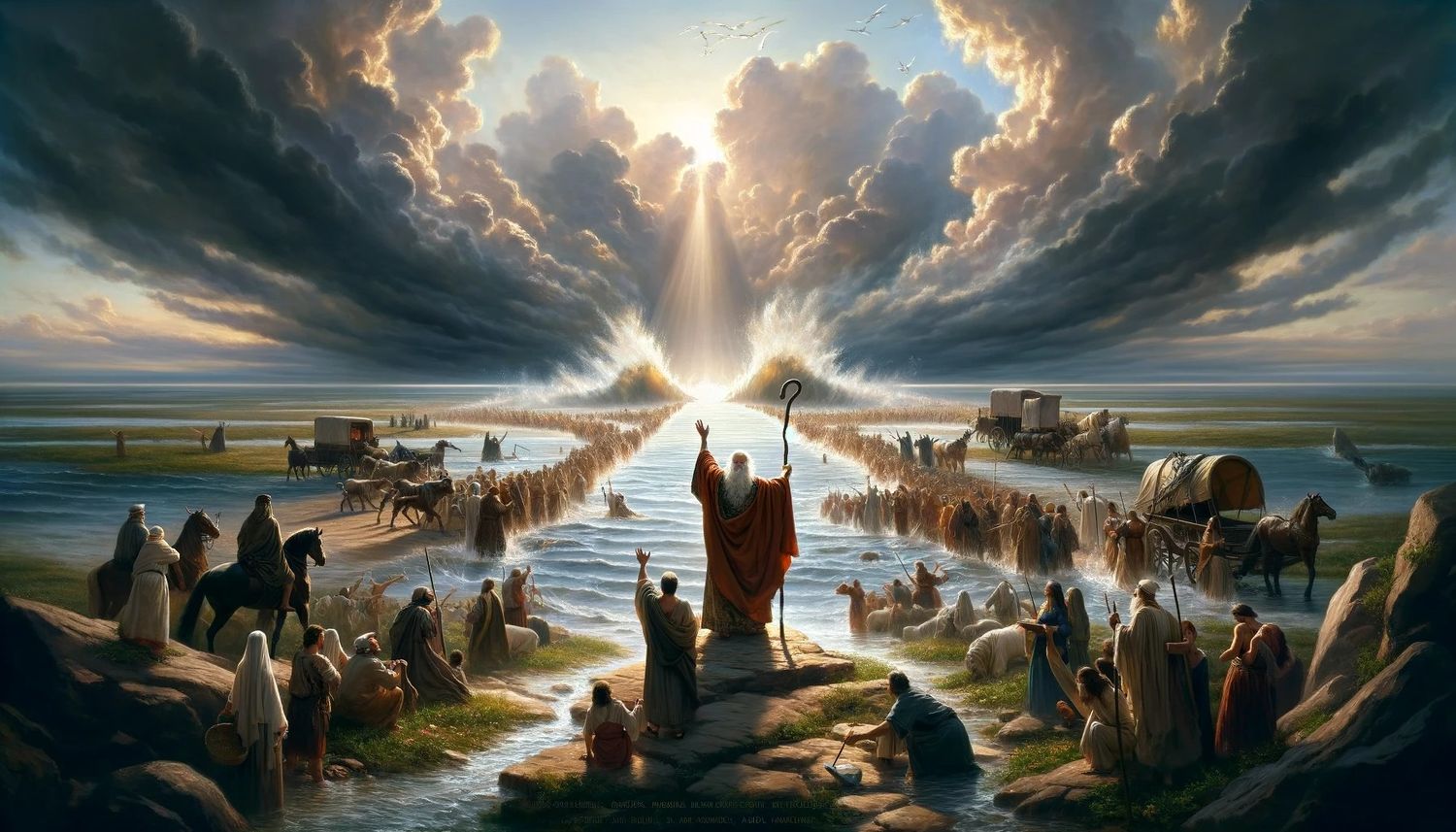Home>Theology and Spirituality>What Is The Baptism Of Moses


Theology and Spirituality
What Is The Baptism Of Moses
Published: March 2, 2024
Ericka Andersen, an editor at Christian.net, expertly merges digital strategy with content creation, focusing on faith and societal issues. Her communication skills enhance the platform's engaging narratives, fostering meaningful dialogue on belief's impact on society.
Discover the significance of the baptism of Moses in theology and spirituality. Explore its meaning and relevance in biblical teachings.
(Many of the links in this article redirect to a specific reviewed product. Your purchase of these products through affiliate links helps to generate commission for Christian.net, at no extra cost. Learn more)
Table of Contents
Introduction
What is the baptism of Moses? The baptism of Moses is a significant event in the Old Testament that holds great spiritual and symbolic meaning. This event is not only a pivotal moment in the life of Moses but also carries profound implications for understanding the concept of baptism in the Christian faith. In this article, we will delve into the significance of the baptism of Moses, explore its biblical account, unravel its symbolism, and draw parallels between the baptism of Moses and Christian baptism. Understanding the baptism of Moses is essential for gaining insight into the rich tapestry of religious symbolism and its relevance to the Christian tradition.
Read more: Who Is Moses In Catholicism
The significance of the baptism of Moses
The baptism of Moses holds immense significance in both the Old Testament and its relevance to the Christian faith. It marks a profound transition in the life of Moses and the Israelites, symbolizing liberation, purification, and divine covenant. This event signifies the deliverance of the Israelites from the oppressive rule of the Egyptians and their emergence as a chosen people of God. The baptism of Moses represents a spiritual rebirth and the beginning of a new chapter in the history of the Israelites, highlighting the transformative power of God's intervention in the lives of His people.
The baptism of Moses also serves as a prefiguration of Christian baptism, foreshadowing the redemptive work of Jesus Christ. It symbolizes the washing away of sin, the crossing from bondage to freedom, and the establishment of a covenant relationship with God. The significance of the baptism of Moses resonates throughout the biblical narrative, laying the foundation for understanding the profound spiritual truths embodied in the act of baptism within the Christian tradition. It stands as a testament to the enduring relevance of Old Testament events in shaping the theological framework of the New Testament and the Christian faith.
The baptism of Moses is not merely a historical event but a spiritual archetype that embodies the themes of deliverance, purification, and divine calling. Its significance reverberates through the ages, offering profound insights into the redemptive work of God and the transformative power of faith. Understanding the baptism of Moses is essential for comprehending the spiritual heritage that undergirds the Christian sacrament of baptism, illuminating the timeless truths encapsulated in this sacred rite of initiation into the body of Christ.
The biblical account of the baptism of Moses
The biblical account of the baptism of Moses is found in the book of Exodus, a pivotal narrative that chronicles the deliverance of the Israelites from slavery in Egypt. In Exodus 14, the Israelites, led by Moses, found themselves trapped between the Red Sea and the pursuing Egyptian army. In a miraculous display of divine intervention, God instructed Moses to stretch out his hand over the sea, causing it to part and creating a path of dry land for the Israelites to cross. As the Israelites passed through the parted waters, they experienced a profound deliverance from the bondage of Egypt, marking a pivotal moment in their history.
The crossing of the Red Sea can be understood as a form of baptism, as the Israelites passed through the waters, they were symbolically cleansed and reborn as a liberated people. This event signified their transition from slavery to freedom, from despair to hope, and from oppression to divine favor. The baptism of Moses, therefore, represents a powerful act of God's deliverance and the establishment of a new identity for the Israelites as the chosen people of God.
The biblical account of the baptism of Moses is not merely a historical narrative but a profound allegory of spiritual truth. It foreshadows the Christian concept of baptism as a symbolic act of purification, liberation, and initiation into a covenant relationship with God. Just as the Israelites emerged from the waters of the Red Sea as a new people, so too do Christians emerge from the waters of baptism as a new creation in Christ, liberated from the power of sin and death.
The biblical account of the baptism of Moses serves as a foundational narrative that illuminates the spiritual significance of baptism within the Christian tradition. It underscores the transformative power of God's intervention in the lives of His people and the enduring relevance of Old Testament events in shaping the theological framework of the New Testament. The baptism of Moses stands as a timeless testament to the redemptive work of God and the profound symbolism embedded in the act of baptism, bridging the ancient Israelite experience with the spiritual heritage of the Christian faith.
The symbolism of the baptism of Moses
The baptism of Moses carries profound symbolism that resonates throughout the biblical narrative and holds significant parallels to the Christian concept of baptism. This pivotal event symbolizes liberation, purification, and divine covenant, encapsulating the transformative power of God's intervention in the lives of His people. The crossing of the Red Sea by the Israelites under the leadership of Moses represents a spiritual rebirth and the emergence of a chosen people, signifying their transition from bondage to freedom. The waters of the Red Sea served as a boundary between slavery and deliverance, marking a symbolic passage from oppression to divine favor. This act of crossing the sea can be understood as a form of baptism, where the Israelites experienced a profound cleansing and rebirth, emerging as a liberated community with a renewed identity.
The baptism of Moses also symbolizes the establishment of a covenant relationship between God and the Israelites. Through their passage through the waters, the Israelites entered into a new phase of their relationship with God, marked by His deliverance and guidance. This covenantal aspect of the baptism of Moses foreshadows the Christian understanding of baptism as an initiation into a covenant relationship with God, where believers are united with Christ in His death and resurrection. The symbolism of covenantal renewal and divine favor embedded in the baptism of Moses finds resonance in the Christian sacrament of baptism, where individuals are united with the redemptive work of Jesus Christ and welcomed into the community of faith.
Furthermore, the baptism of Moses serves as a powerful symbol of spiritual purification and liberation. The act of passing through the parted waters represents a cleansing from the bondage of Egypt and a separation from the oppressive forces that sought to enslave the Israelites. This symbolic purification through the waters prefigures the Christian understanding of baptism as a rite of initiation into the body of Christ, where believers are cleansed from sin and born anew in the Spirit. The baptism of Moses, therefore, embodies the timeless truth of spiritual purification and liberation, pointing towards the redemptive work of God in the lives of His people.
In essence, the symbolism of the baptism of Moses extends far beyond a historical event, encompassing profound spiritual truths that resonate with the Christian understanding of baptism. It serves as a powerful archetype of liberation, purification, and covenantal renewal, offering timeless insights into the transformative power of God's intervention in the lives of His people. Understanding the rich symbolism of the baptism of Moses is essential for grasping the spiritual heritage that undergirds the Christian sacrament of baptism, illuminating the enduring significance of this sacred rite within the Christian tradition.
The parallels between the baptism of Moses and Christian baptism
-
Symbolism of Liberation: The baptism of Moses and Christian baptism both symbolize liberation from bondage. Just as the Israelites were delivered from the oppression of Egypt through the crossing of the Red Sea, Christian baptism signifies liberation from the power of sin and death through the redemptive work of Jesus Christ. Both events mark a transition from enslavement to freedom, embodying the transformative power of God's intervention in the lives of His people.
-
Cleansing and Rebirth: The baptism of Moses and Christian baptism both represent a form of cleansing and rebirth. The Israelites' passage through the waters of the Red Sea symbolized a cleansing from the bondage of Egypt and a rebirth as a liberated community. Similarly, Christian baptism signifies a spiritual cleansing from sin and a new birth into the family of God. Both acts of baptism serve as a symbolic initiation into a renewed identity and a transformed relationship with God.
-
Establishment of Covenant: The baptism of Moses and Christian baptism both entail the establishment of a covenant relationship with God. The Israelites' passage through the Red Sea marked a new phase in their relationship with God, characterized by His deliverance and guidance. Likewise, Christian baptism signifies an initiation into a covenantal relationship with God, where believers are united with Christ in His death and resurrection, and welcomed into the community of faith. Both acts of baptism symbolize a commitment to walk in obedience and faithfulness to God's covenant.
-
Foreshadowing of Redemption: The baptism of Moses foreshadows the redemptive work of Jesus Christ. Just as the Israelites' deliverance through the Red Sea prefigured the liberation and establishment of a new identity, Christian baptism anticipates the redemptive work of Jesus Christ, where believers are united with Him in His death and resurrection. The baptism of Moses serves as a prophetic signpost pointing towards the ultimate redemption and salvation brought about by Jesus Christ, thereby establishing a profound parallel with Christian baptism.
-
Spiritual Purification and Liberation: Both the baptism of Moses and Christian baptism symbolize spiritual purification and liberation. The act of passing through the parted waters of the Red Sea represents a cleansing from the bondage of Egypt and a separation from oppressive forces. Similarly, Christian baptism signifies a spiritual purification from sin and a liberation into newness of life. Both acts of baptism embody the timeless truth of spiritual purification and liberation, underscoring the transformative power of God's redemptive work in the lives of His people.
In essence, the parallels between the baptism of Moses and Christian baptism are deeply rooted in the themes of liberation, purification, covenantal renewal, and the foreshadowing of redemption. Understanding these parallels illuminates the profound spiritual continuity between the Old Testament narrative of the baptism of Moses and the Christian sacrament of baptism, highlighting the enduring significance of these sacred rites within the tapestry of religious symbolism and theological truth.
Read more: What Did Jesus Christ Think About Moses
Conclusion
The baptism of Moses stands as a profound and timeless testament to the transformative power of God's intervention in the lives of His people. Its significance reverberates through the biblical narrative, offering profound insights into the themes of liberation, purification, and covenantal renewal. The symbolism of the baptism of Moses resonates deeply with the Christian understanding of baptism, drawing parallel themes of deliverance, rebirth, and covenantal relationship with God. Understanding the rich heritage encapsulated in the baptism of Moses is essential for grasping the spiritual tapestry that undergirds the Christian sacrament of baptism. It serves as a bridge between the ancient Israelite experience and the spiritual legacy of the Christian faith, illuminating the enduring relevance of these sacred rites within the framework of religious symbolism and theological truth. The baptism of Moses stands as a testament to the enduring significance of Old Testament events in shaping the theological landscape of the Christian tradition, offering timeless insights into the redemptive work of God and the transformative power of faith.













